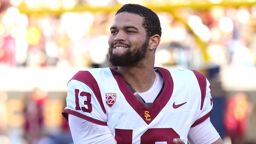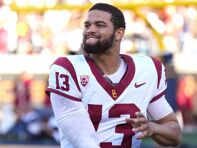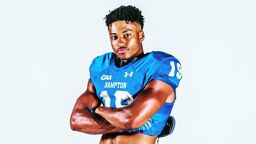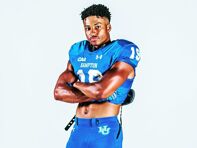With the college football season halfway over for most teams, I decided to check the cumulative record of the seven teams with openly gay or bi players. The fact that I had no idea what it was before doing research says a lot.
The teams are collectively struggling, with a combined 13-25 record, though that is skewed by the 1-5 mark of Northwoods University (offensive lineman Jacob Van Ittersum,) and 0-5 of Capital University in Ohio ( receiver and punter Wyatt Pertuset). Butler (linebacker Xavier Colvin) is 3-2, Arizona (defensive lineman My-King Johnson) 3-3, Air Force (safety Bradley Kim) 2-3, Indiana State 2-3 (cornerback Jake Bain) and Kansas State (tackle Scott Frantz) 2-4. Van Ittersum is bi and the other players gay.
These records means nothing in terms of the players’ sexual orientation. Some of the out players like Van Ittersum, Colvin, Frantz and Pertuset either start or play meaningful minutes, while the others are injured or play sparingly. With rosters of 85 or more, college football teams are way too big for any one player short of a star quarterback or running back to have a major impact on a team’s season record.
Some of the out players have shined. Pertuset was featured on ESPN after scoring a touchdown and was his conference’s special teams player of the week. Frantz was named to the Big 12 All-Week 3 team by Pro Football Focus after grading out high. Colvin has been a key contributor to Butler’s defense.
On the other hand, the cumulative record means everything in one regard — no one cares. Outside of Outsports, whose mission is to cover LGBT athletes, these players’ sexual orientations are not mentioned in media coverage of their games. Their being gay is interesting from a feature standpoint (the New York Times is preparing a story on Bain) but has zero relevance to an actual game. Football is football.
For years, the stereotype held that an openly gay football player would cause a locker room distraction and be an ongoing story. The fact that these out players have gotten relatively little attention outside of their initial coming out stories shows this distraction idea was just a myth. Their teammates and coaches have long gotten past the novelty aspect and these players get no special attention, which is how it should be.
This doesn’t mean that these seven are shying away from being role models for other LGBT athletes considering whether to come out. Colvin is very aware of the importance of him being out.
“There are seven of us in NCAA football who are out,” Colvin told Butler’s online publication. “Statistics show there’s more than seven. So I would hope someone could see my story and see my situation and know that everything is going to be OK, everything can be OK.
“You don’t have to continue to lie and not be yourself. I think that’s the main reason I’ve done what I’ve done — to help the next person, that kid who’s going into high school soon and trying to figure themselves out before the real world hits them.”
Seven out players out of thousands is still way too few, but their experiences in 2018 are showing that is becoming less and less of a big deal, and that’s progress,

































